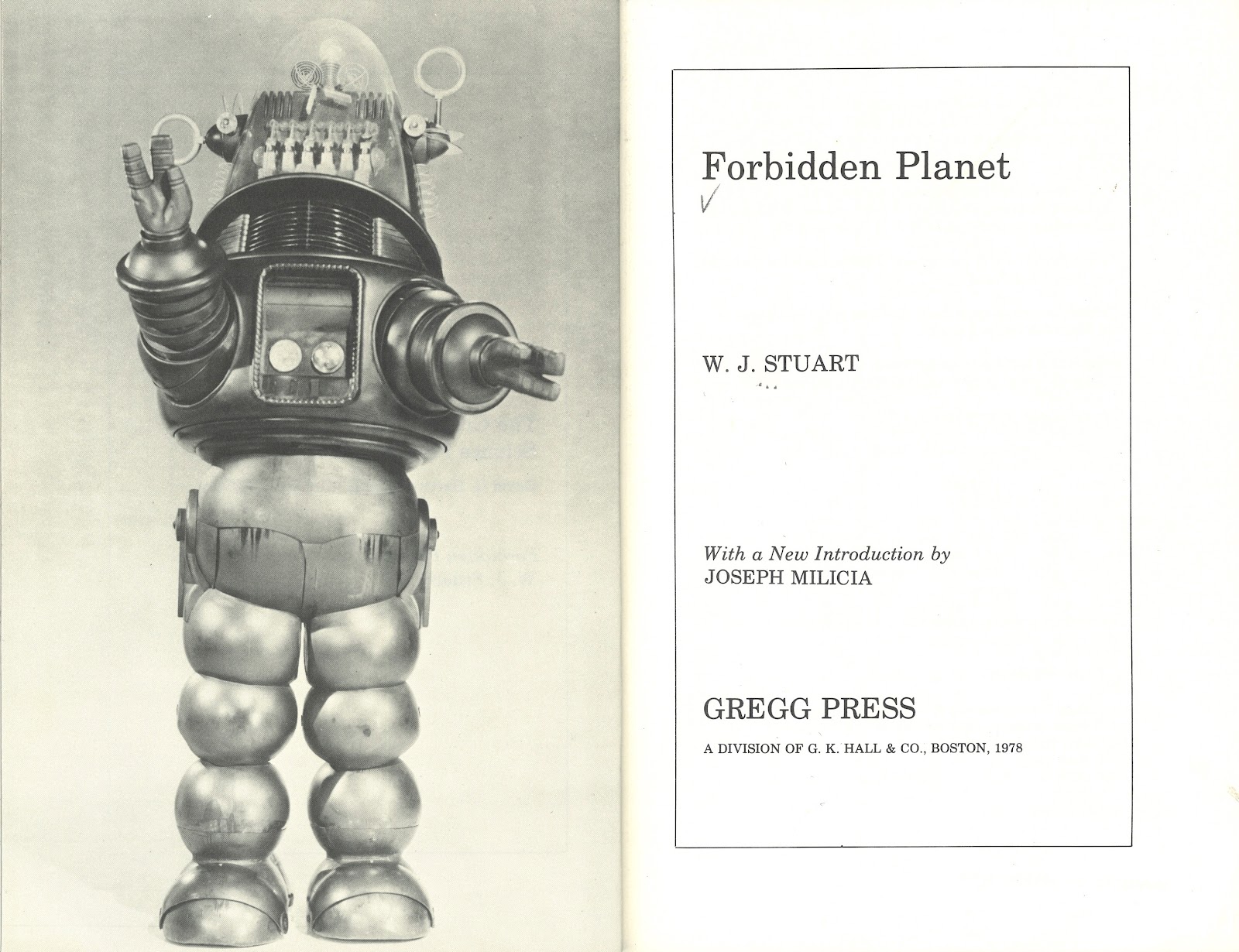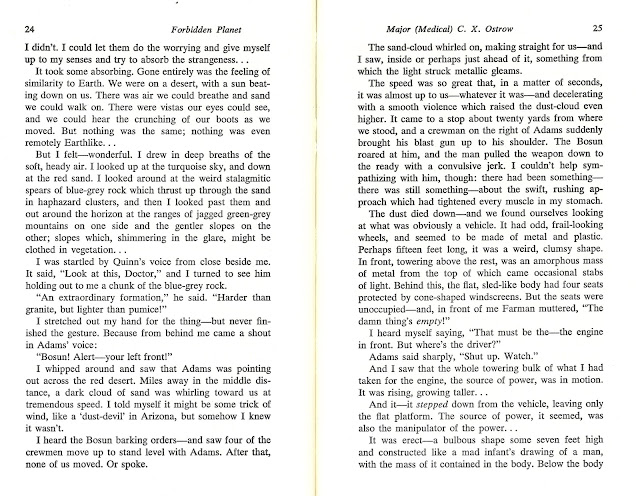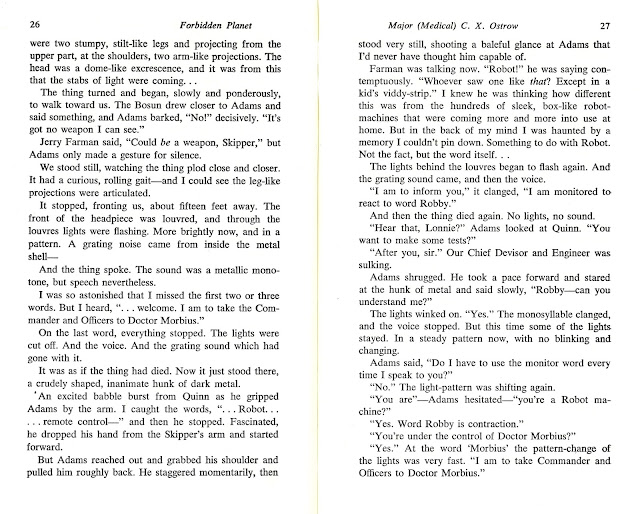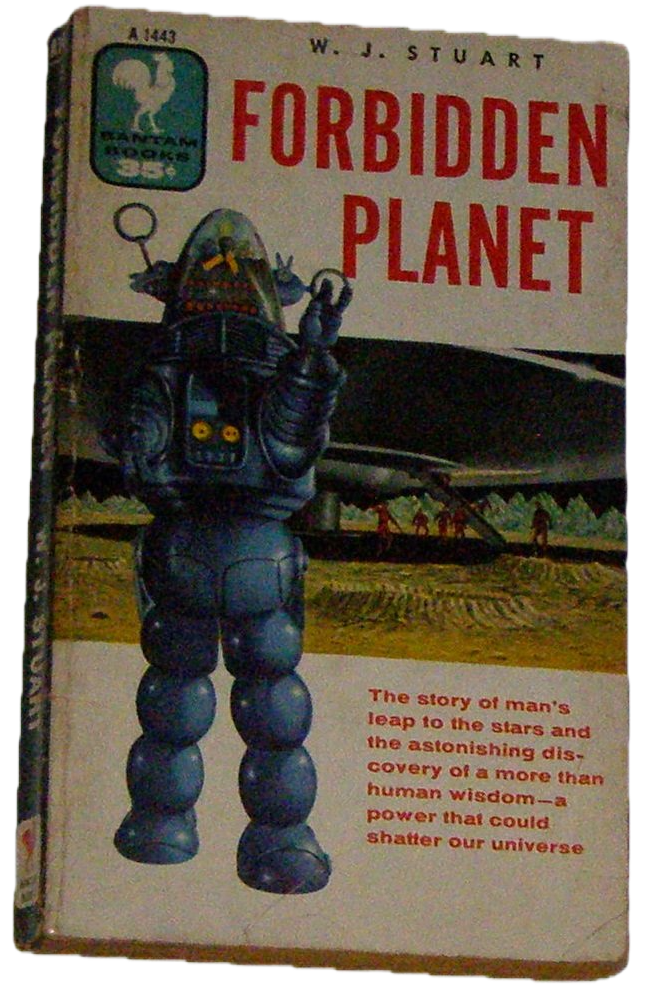Aficionados of Shakespeare and film have likely come across the classic 1956 film Forbidden Planet, which owes a good deal to The Tempest (for a brief post on the film, q.v.).
But, like me, they may not have known that a novelization of the film was published in 1956.
One of the main points of interest is that the novelization departs in some ways from the film. Instead of being a straightforward retelling, it explores different themes and ideas. Indeed, I think I'd like to call it Forbidden Planet: The Novel rather than designating it a novelization.
[Note: The Wikipedia entry on the film can stand in for a pure novelization—and it will also give you the basic plot.]
The edition I tracked down had a good analysis of the novel's departures from the film—and, before we go any further, it also had a number of stills from the film. I'll just provide one. You may recognize Leslie Nielsen from the Julius Caesar scene in Naked Gun (for which, q.v.). But he also stars in Forbidden Planet as Commander J. J. Adams.
One thing that makes this more of a novel than a novelization is its structure. As the table of contents shows, we are presented with three points of view on the plot as it unfolds. The Medical Major (think Bones (a.k.a Dr. Leonard McCoy) in Star Trek: The Original Series) gives us something of the technical outsider's experience of space travel and planetary exploration. We also get the Commander's take on things—including a lot of internal rumination that the film doesn't explore, such as his feelings for Dr. Edward Morbius' daughter Altairia. And then we get the voice and point of view of Morbius himself, providing keen insight into his past and his motivations as well as the past of Altair IV, the planet he landed on twenty years previously.
One thing that makes this more of a novel than a novelization is its structure. As the table of contents shows, we are presented with three points of view on the plot as it unfolds. The Medical Major (think Bones (a.k.a Dr. Leonard McCoy) in Star Trek: The Original Series) gives us something of the technical outsider's experience of space travel and planetary exploration. We also get the Commander's take on things—including a lot of internal rumination that the film doesn't explore, such as his feelings for Dr. Edward Morbius' daughter Altairia. And then we get the voice and point of view of Morbius himself, providing keen insight into his past and his motivations as well as the past of Altair IV, the planet he landed on twenty years previously.
As is Bardfilm's wont, here's a representative sample from the book. I've chosen part of Ostrow's narrative because it provides that outsider's point of view and because it offers some thoughts on Robby the Robot—thoughts that you may find akin to current reactions to various AI applications.
I enjoyed this novel thoroughly. It fits in the classic science fiction genre, but it plays with it in intriguing ways. And there's a lot of interest in the way these humans behave on an alien planet. At one point, one of the new arrivals on the planet casually tosses down a cigarette and steps on it to extinguish it. It's an offhand moment, but it's telling.
I've avoided major spoilers to this point, but the final image will give a lot away. You're free to consider yourself dismissed if you wish.
For those who have stayed on, the Postscript to the novel provides a more detailed reading of the way the plot ends. We're invited to imagine that we have these point-of-view sections in part because of technology that does some sort of brain-to-text transference. We also learn that the Commander marries Altaira during their flight back to Earth. And we have some opinions on the self-destruction of the entire planet of Altair IV.
Forbidden Planet is a film well worth watching; Forbidden Planet is a novel well worth reading, whether on its own or as a companion to the film.


















No comments:
Post a Comment